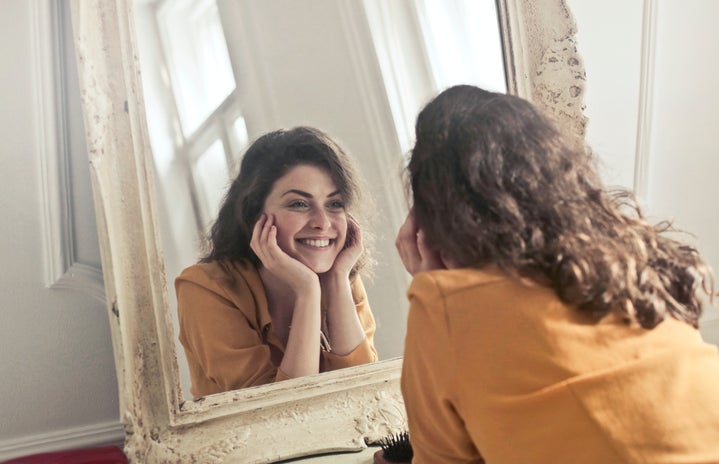There is a song that has always tugged on my heart the second I start listening to it: “Messages From Her” by Sabrina Claudio is a song that has made me stop and think about how impactful perception is. In the song, Claudio talks about how much she reminisces on her childhood and how she took the simplicity of life for granted. She makes it clear in the song how much she wishes she could speak to her younger self and hear her perspective on what the meaning of happiness truly is.
Ironically, after listening to the song for the first time, I found myself longing for the same thing—I wanted to know my younger self’s perception of what true happiness feels like since, at the time, I didn’t have a clue.
Looking back, I knew what I struggled with the most was figuring out what made me happy. I had so many things to be grateful for, such as my health, education, excellent support system and so much more. Yet, it dawned on me that regardless of how good I had it, the main thing that I never seemed satisfied with was myself. I was not aware of how much my perception of myself was just overall negative. In other words, I lacked self-love.
The self-love overview
Many people mistakenly believe that self-love is selfish or equivalent to having a big ego, but it is not. Self-love refers to having a high regard for your well-being and happiness. It means taking care of your own needs and not sacrificing your well-being to please others. When you love yourself, you accept your so-called weaknesses and appreciate these shortcomings as something that makes you who you are. Self-love means not settling for less than what you deserve and not being afraid to prioritize your wants and needs, regardless of what others think. Otherwise, you give in to the lure of conformity.
Conformity can easily affect an individual’s journey to self-love because we’re used to living in a society where fitting in is encouraged. Psychologists use “conformity” as a term to indicate an agreement to the majority position, brought about by either a desire to “fit in” or be liked. Individuality and having an “outside of the box” mindset are encouraged until society deems it odd and uncomfortable. Conformity can also be defined as “yielding to group pressures.” Although it is traditional to conform to a certain extent and consider others’ needs in order to have functioning friendships and relationships, conformity should never become a continual sacrifice.
The self-love epiphany
Self-love is reassuring yourself that it’s okay to put yourself first. For most, it seems selfish to do so, and individuals will go the majority of their lives not realizing that they never prioritized themselves. Still, each person’s self-love journey is different. In my case, it required teaching myself a lot of patience.
During this year, I have gone through many dramatic changes–aside from adjusting to a global pandemic. With nothing to do other than stay at home and drown in schoolwork, I noticed the same pattern of questioning why I never felt happy with myself. Whenever I thought about it, I couldn’t help but feel even more upset with myself because I had so many things in my life that brought me happiness. Yet, it never dawned on me that it was only instant gratification. Instant gratification was easy for me to mistake for happiness; however, the feeling was never long-lasting, and it began to damage my perception of happiness in general. It began to ruin close relationships and friendships and even began affecting my mental health. I was beginning to realize that many things in my life were giving me instant gratification, and I fed off of it.
My self-love journey began right when I decided to let go of things that only gave me instant gratification.
Doing so meant having to close many significant chapters in my life. I went from having vital people in my life that I thought I needed to be happy to learning how to be okay alone. Being alone is uncomfortable, and it tempts you into wanting to go back to old habits. In my case, I did let old habits creep in, but learning how to stop them from controlling my self-love journey was both my biggest challenge and my biggest success. Being alone isn’t always the best in most situations; however, it doesn’t deserve the bad rap that it has. Being alone is what encouraged me to make a habit of taking self-love seriously.
The self-love journey
Being in this new chapter of my life opened my eyes to things that I never thought I’d consider. I began to genuinely understand where my mental health was and wanted there to be a significant change, which led me to push myself out of my comfort zone, mentally and physically.
For one, I began to view my time alone as a time to self-evaluate, rather than focus on the aspect of being lonely. Valuing my “alone time” in order to focus on my mental health was a massive step on the self-love journey. I took the time to instill a habit of journaling daily affirmations. At first, it seemed silly to write such positive things that I was so used to critiquing. However, after about two weeks, my attitude about myself began to alter: I felt more confident and content. This was only the start of making room for healthy habits.
Soon after that, I began to embrace the concept of stepping out of my comfort zone even more. Taking morning runs before my classes was a great way for me to clear my mind. Additionally, I began to do yoga in the evenings and treated myself to Starbucks or even ice cream after long days of studying. As simple as these actions seem, they made a significant impact on my life and overall mindset. I recognized that I wanted to practice new habits, not “getting them done” because I “had to,” but because I cared about my priorities. The practice of self-love is the practice of nourishing yourself.



